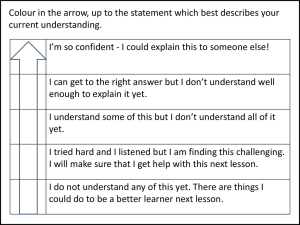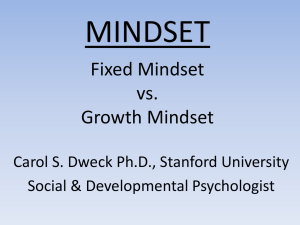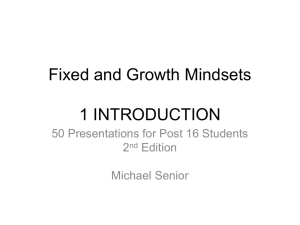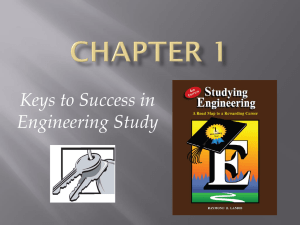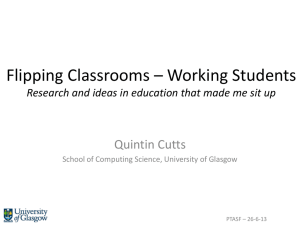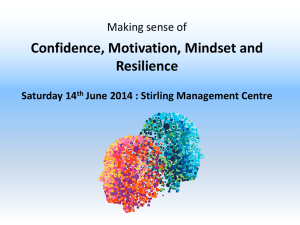Growth Mindset - Prince Philip Public School
advertisement
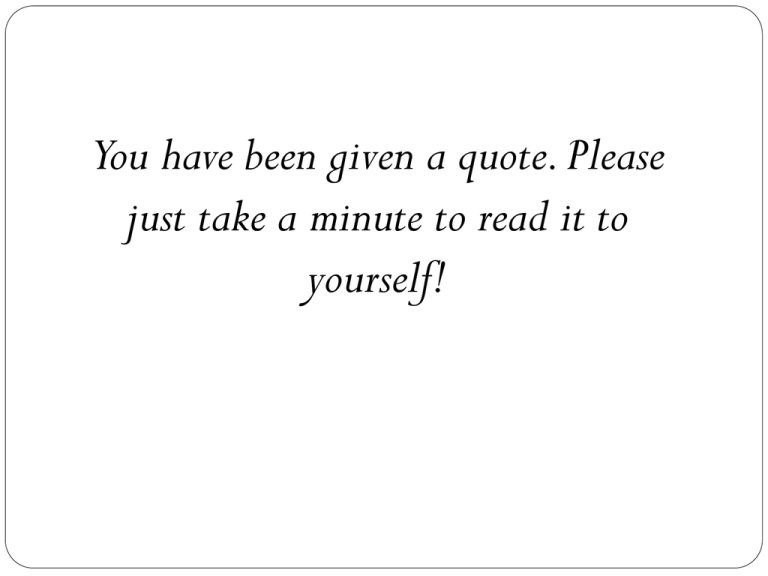
You have been given a quote. Please just take a minute to read it to yourself! Mindset Family of Schools School Advisory Council October 2014 Carol Dweck Dr. Carol Dweck is one of the world’s leading researchers in the field of motivation and has devoted decades to growth mindset research. Much of what we, at the DSBN are learning about mindset and its impact on learning is based on her research Her books include: Mindset and Self-Theories Mindset (according to Oxford English dictionary) (noun) The established set of attitudes held by someone Eduardo Briceno Eduardo is the CEO of Mindset Works, an organization he co-founded with Carol Dweck, Ph.D., Lisa Blackwell, Ph.D., and others to equip people with the core beliefs and learning strategies needed for success. They help schools throughout the world build learner capacity by instilling growth mindset beliefs and practices in students, teachers and the broader community. Eduardo Briceno on Mindset Mindsets Fixed Growth Intelligence is a fixed trait Intelligence is a malleable quality, a potential that can be developed Impact of Mindset on Goals Students with a Fixed Mindset say: Students with a Growth Mindset say: Looking smart is most Learning is most important important “The main thing I want when I do my school work is to show how good I am at it.” “It’s much more important for me to learn things in my classes than it is to get the best grades.” Adapted from Mindset Works - Brainology® “Research Overview” Impact of Mindset on Effort Beliefs Students with a Fixed Mindset Students with a Growth Mindset Effort is negative Effort is positive “To tell the truth, when I work hard at my school work it makes me feel like I’m not very smart.” “The harder you work at something, the better you’ll be at it.” Adapted from Mindset Works - Brainology® “Research Overview” Impact of Mindset on Strategies After Failure Students with a Fixed Mindset Students with a Growth Mindset Helpless Resilient “I would spend less time on this subject from now on.” “I would try not to take this subject ever again.” “I would try to cheat on the next test.” “I would work harder in this class from now on.” “I would spend more time studying for the tests.” “I learn from mistakes!” Adapted from Mindset Works - Brainology® “Research Overview” Check this out! A Study on Praise and Mindsets A scenario to consider Nine-year-old Elizabeth was on her way to her first gymnastics meet. Lanky, flexible, and energetic, she was just right for gymnastics, and she loved it. Of course, she was a little nervous about competing, but she was good at gymnastics and felt confident of doing well. She had even thought about the perfect place in her room to hang the ribbon she would win. In the first event, the floor exercises, Elizabeth went first. Although she did a nice job, the scoring changed after the first few girls and she lost. Elizabeth also did well in the other events, but not well enough to win. By the end of the evening, she had received no ribbons and was devastated. What would you do if you were Elizabeth’s parents? 1. 2. 3. 4. 5. Tell Elizabeth you thought she was the best. Tell her she was robbed of a ribbon that was rightfully hers. Reassure her that gymnastics is not that important Tell her she has the ability and will surely win next time. Tell her that her effort was great and she should keep working. According to Carol Dweck (2006) There is a strong message in our society about how to boost children’s self-esteem, and a main part of that message is: Protect them from failure! While this may help with the immediate problem of a child’s disappointment, it can be harmful in the long run. Why? Let’s look at the five possible reactions from a mindset point of view (and listen to the messages): According to Carol Dweck (2006) The first (you thought she was the best) is basically insincere. She was not the best – you know it, and she does too. This offers her no recipe for how to recover or how to improve. The second (she was robbed) places blame on others, when in fact the problem was mostly with her performance, not the judges. Do you want her to grow up blaming others for her deficiencies? The third (reassure her that gymnastics doesn’t really matter) teaches her to devalue something if she doesn’t do well in it right away. Is this really the message you want to send? According to Carol Dweck (2006) The fourth (she has the ability) may be the most dangerous message of all. Does ability automatically take you where you want to go? If Elizabeth didn’t win this meet, why should she win the next one? The last option (tell her she had great effort and should keep working) fosters perseverance and honours the work she’s already done. It would also be healthy to share the idea that her competition was really good. “Yet” Carol Dweck on the power of "yet" Consider your quote! Please take a look at the quote we gave you at the beginning and consider how it relates to the concept of mindset. Share your ideas with the person/people sitting next to you. Do you have any questions? Comments? A little inspiration… A boy and a bike Interested in more information? If you’d like more information about Mindset, please let your school’s administration know!
